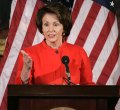We’re used to hearing politicians, especially those on the secular left, decry the influence of religion in politics.  Such influence, they wail, breaches the wall between Church and State.
Such influence, they wail, breaches the wall between Church and State.
So it was interesting to read that the Speaker of the US House of Representatives, Nancy Pelosi called on the Catholic Church to speak out from the pulpit to promote immigration reform at the start of this month.
Earlier this month Speaker Pelosi said: “The cardinals, the archbishops, the bishops come to me and say we want you to pass immigration reform. And I said, ‘But I want you to speak about it from the pulpit.’
“I want you to instruct your—whatever the communication is, the people, some oppose immigration reform are sitting in those pews, and you have to tell them that this is a manifestation of our living the gospels.”
Whatever one thinks of the issue of immigration reform – and it is a highly controversial and divisive issue – one might think it was encouraging to see Speaker Pelosi, a leading Democrat, welcoming Church involvement in politics.
But six years ago Pelosi had a very different view. She signed a letter—along with 47 other leading US politicians—to Cardinal Theodore McCarrick which said “allowing a bishop to take actions that lead to involvement in partisan politics would be detrimental to the Church.”
The letter, dated May 10, 2004, was written in protest at certain US bishops denying communion to legislators who vote for abortion.
So in 2004 she objected to Church involvement in politics even though, technically speaking, the Church was deciding who could and who could not receive the sacraments so surely Pelosi was interfering in the Church, not the other way around.
But this year she is actively seeking Church support for something she supports, to the point of asking clergy to support her political agenda.
So the message is clear, she wants the Church out of politics when it suits her, and involved in politics when it suits her. Where is the principled secular belief in ‘separation of Church and State’ (what they might mean by that exactly)?
This double standard is applied in Ireland, too. A classic manifestation was the secular left’s attitude to the anti-government street protest by Buddhist monks in Burma in 2008. Leading representatives of the Irish left, including Senators Ivana Bacik and David Norris, fell over themselves to praise and support the monks.
Also, the secular left rarely complains when representatives of the Church call for greater levels of income redistribution, or more environmentally friendly policies, or greater levels of international aid. On issues like this, apparently, the wall separating Church and State may be lowered, at least temporarily.